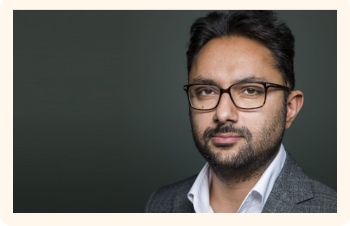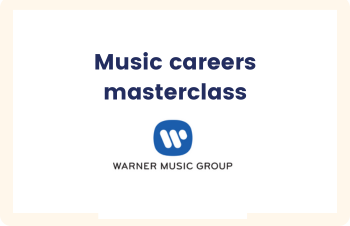Last night the Creative Access community got to visit the prestigious BAFTA offices. We were able to get behind the scenes and gain exclusive insights into the inner workings of this renowned entertainment icon including TV, film and gaming.
The panel discussion featured directors, gaming professionals, programmers, and diversity advocates, and touched on the many issues within the creative industries such as routes in, networking, key skills and, perhaps most importantly, the power of self-belief.
Chaired by Tim Hunter, executive director of learning and inclusion, the discussion kicked off with our panel sharing how they fell into their roles, or in some cases how their roles found them. Ashley Francis-Roy, director and CA alum, revealed he found a way in through a Creative Access internship with BBC Art and Music. After studying a degree in music, he worked his way up through a number of runner, assistant producer, and director roles. “My degree made me smarter” he says, before touching on the fact that although always knowing he wanted to direct, his degree taught how important it is to be able to “make it happen yourself”.
Mariayah Kaderbhai, head of programmes at BAFTA echoed this when speaking on her own university experience: “You have to engineer what you want”, saying that her course helped her explore her interests, even if they weren’t always directly aligned, by taking lots of film and cinema modules. She then interned at the BFI and has now been at BAFTA for 20 years.
Our final panel panelist Sara Machado, works in recruitment as senior talent acquisition partner at game developer, Sumo Digital, is no stranger to also making it happen yourself. After studying international defense with the dream of being a spy, Sara moved from Brazil to the UK seven years ago and has been making it happen ever since. “When I got my first job, I started thinking about how I’d get my second” she explained, “there are just so many pathways”, our panel shared a number that you can start trying now.
“Develop a sense of who you are, what you want and tell people!” Mariayah

There are often loads of roles in your favorite organizations that you might even not think of. For example, community management, or operations, or legal – it’s helpful to think of these companies like a machine, with many parts that all help it work. With this mindset, it’s easier to see lots of fantastic opportunities where you can learn more about the industry. Mariayah spoke about festivals and open submission roles where you can be paid a day rate to watch films! Tim shared the brilliant free-to-access BAFTA toolkit, which may be more relevant for those who have already made their short film, but still worth taking a look at.
When asked about networking, the panel had lots of top tips to share and encouraged our audience to put these into practice with the networking session that followed the discussion. Ashley commented that networking “doesn’t always have to pay off next week” but rather should be just about making that connection so that when an opportunity does arise, your name is first in their minds. For those who don’t enjoy the dreaded task of networking, Mariayah says “cut the small talk”, instead begin with what you do know, who you are and what you’re passionate about. However, walking into these rooms can still feel really daunting for some; if that sounds like you Sara speaks on the relevance of building an online community through attending webinars, workshops and even literally creating a map of the influential people you’d like to get in front of and beginning there. After her autism diagnosis in January, Sara makes sure to tell our audiences to “understand your limits”. Networking can sometimes be quite socially exhausting, so it’s important to find a way to make it work for you.
“It’s so important to be able to talk to lots of different types of people…” Tim
A lot of our audience wanted to know about skills to succeed in film, gaming and tv industries that you might not expect, and the panel again shared some gems. Ashley told us the power of positive thinking, “you can’t accept defeat” he says, “you need to find a way around it”. Sara and Mariayah agreed, adding critical thinking, diplomacy, time management and a good portfolio –which can sometimes be even more important than a good CV. Sara said it’s good to be someone who naturally enjoys solving problems “there are two types of people” she continues “those who panic when there’s a fire, and those who relish starting from scratch”. Being able to talk about yourself is also a must, Sara uses the formula of qualitative and quantitative statements to show impact. It’s important to remember there may always be obstacles and unexpected events, but being able to bounce back and redirect is a key skill for success.

“As long as I am adding value, I don’t allow myself to feel bad!” Sara
We also touched on imposter syndrome and how best to deal with the creeping feeling that you might not be good enough to enjoy what you have achieved. Imposter syndrome casts a shadow of doubt and self-deprecation over the talented individuals who really don’t need to be as hard on themselves as they are. “It’s not a helpful term” Ashley says, “there will always be moments like that in your career, but you have to encourage yourself to take up space”. Ashley makes a point to say he rejects impostor syndrome and Sara agreed. “What’s being good enough? Who decided that?” she asks. Imposter syndrome does nothing but hinder confidence and prevent you from embracing your uniqueness. It is a silent battle that many creatives face, but by recognizing and confronting imposter syndrome head-on, Mariayah says “you can hold onto your story, and hold onto who you are”.
In the vast landscape of creative industries, finding your tribe is a crucial step towards success and personal growth. These connections will not only inspire and support you but also serve as invaluable resources for collaboration, mentorship, and professional opportunities. The panel spoke about how useful it was to have a champion, or someone who could speak to your experience and passion in rooms you hadn’t been able to reach yet. Ashley’s Creative Access mentor, for example, helped him with placements and job applications.
“Every time I stepped up in my career, someone’s championed me…those people are so important” Ashley
Your network becomes a lifeline, providing guidance, feedback, and a sense of belonging in an industry that can often feel overwhelming. Together, you and your network can navigate the creative landscape, celebrating achievements, sharing knowledge, and propelling each other towards greater heights.
We would like to extend our heartfelt thanks to our panel and BAFTA for hosting our masterclass and to each and every one of you who attended the event.




